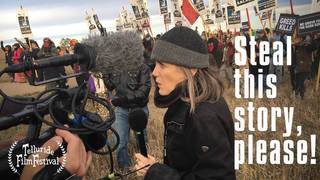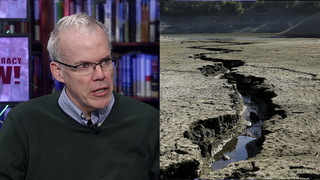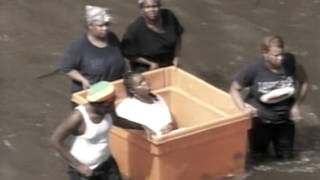
Guests
- Charlie Crayresearch specialist for Greenpeace. He was the lead researcher on the fossil fuel lobbyists’ contributions to the Clinton campaign.
- Eva Resnick-Daydemocracy organizer for Greenpeace. She confronted Hillary Clinton about donations to her campaign from the fossil fuel industry.
According to a new report by Greenpeace, Hillary Clinton’s presidential campaign and the super PAC supporting her have received $138,400 from fossil fuel lobbyists and $1,327,210 from bundlers, totaling more than $4.5 million from lobbyists, bundlers and large donors connected the fossil fuel industry. Clinton maintains that she’s received only about $330,000 from individuals who work for fossil fuel companies—about 0.2 percent of the total raised by her campaign. We speak with Charlie Cray, research specialist for Greenpeace and lead researcher on the fossil fuel lobbyists’ contributions to the Clinton campaign, as well as Eva Resnick-Day, a democracy organizer for Greenpeace who confronted Clinton at a rally.
Transcript
AMY GOODMAN: I wanted to turn to Charlie Cray, to some of the numbers from the Greenpeace report on fossil fuel lobbyist contributions to the Clinton campaign. The report shows all Clinton—that Clinton’s campaign and the super PAC supporting her have received close to—or more than $138,000 from fossil fuel lobbyists and more than $1.3 million from bundlers. You say, all told, the campaign has received more than $4.5 million from lobbyists, bundlers and large donors connected the fossil fuel industry. Where is the rest of that money coming from? Who are the lobbyists and bundlers, and who do they represent, Charlie?
CHARLIE CRAY: So, there are 58 lobbyists. Eleven of them work directly for the industry, for ExxonMobil, American Petroleum Institute and other trade associations, and the rest are hired lobbyists who work on behalf of a whole range of gas and oil and coal companies. And 11 of these overall 58 lobbyists have bundled money for the campaign. The total combined between direct contributions and bundled money comes close to $1.5 million, actually.
AMY GOODMAN: And talk about Bernie Sanders and where he’s getting his money from, what your understanding is, if you’ve researched all the candidates.
CHARLIE CRAY: Sure. So, the Clinton campaign has kind of deflected the issue of lobbyists by comparing the direct contributions from industry employees, which she’s taken over $330,000, I think, directly, to Sanders, who has taken something like $50,000. And most of this money, for both, is coming from employees. The pledge we’ve put to all the candidates is to stop taking money from top executives, lobbyists and company PACs. Neither of—none of the Democrats have taken money from company PACs. The top executives is an issue that may distinguish Sanders and Clinton, and, of course, the lobbyists do, as well. Now, we defined the pledge by these three categories because, in fact, Clinton has already pledged not to take any money from top executives, lobbyists or company PACs from the private prison industry. So we feel it’s pretty safe and pretty easy for her to do the same for the fossil fuel industry.
AMY GOODMAN: And how does she compare to the Republicans?
CHARLIE CRAY: Oh, the Republicans have taken far more money. I mean, this is—this is a no-brainer. Almost all of them, with the exception of John Kasich, are outright climate deniers. They have outside super PACs that are taking millions of dollars, in some cases well over $10 million, from very large industry representatives and investors.
AMY GOODMAN: The Washington Post, Charlie Cray, has also challenged your research. They gave you “three Pinocchios.” Can you explain? And how do you respond to them?
CHARLIE CRAY: Well, you know, they—they’re looking at the big picture and saying that the $300,000 comes from low-level employees in the case of Clinton, and they also say that it’s really a small percentage of the contributions, overall, that she’s taken in in her campaign. And what we say is, great, if it’s a small contribution, if you don’t really need it, then stop taking any more of it. As far as lobbyists, you know, and employees, back in 2008 she criticized candidate—then-candidate Obama for taking money from the industry, challenging his assertion that it didn’t affect his vote on the Cheney Halliburton loophole bill, the energy bill of 2005. In 2008 and 2012, Obama himself took no money from any registered lobbyists. And now we see Clinton basically backsliding and taking money from lobbyists of all kinds.
AMY GOODMAN: The Washington Post also says Greenpeace counts all the money raised or contributed by lobbyists as “oil/gas industry” funds, but these lobbyists have many other clients besides the oil industry.
CHARLIE CRAY: Sure. Let’s take a step back here. Clinton has actually taken some very good positions on climate, and she has, you know, pledged to regulate the fracking industry. A lot of those regulations would have to come through Congress. And if you’re taking money from, say, Pharma and the oil and gas industry, Pharma isn’t going to lobby on fracking legislation. The gas industry lobbyists are. And she’s basically taking money from the lobbyists for those very companies who would oppose the policies that she has pledged to.
AMY GOODMAN: How do you respond to the Clinton campaign and other campaigns saying they can’t control what kind of contributions come to super PACs, even that support them, that they’re working independently?
CHARLIE CRAY: Well, legally, they can’t control it, but she can send a signal, and she can say that she doesn’t want super PAC taking any money from the fossil fuel industry. And they would abide by that. So, you know—and Sanders, of course, has said he doesn’t want any super PACs, and nobody has formed one in his favor, so far that I know. So it’s really a question of leadership here and whether or not she wants to pledge not to take any money from the industry to demonstrate her sincerity about the many good policies that she has pledged if she were elected.
AMY GOODMAN: In The Washington Post, Glenn Kessler writes, quote, “In the context of her overall campaign, the contributions are hardly significant. It’s especially misleading to count all of the funds raised by lobbyists with multiple clients as money 'given' by the fossil-fuel industry.”
CHARLIE CRAY: Well, again, these are—there are 58 of these lobbyists. Many of them work for ExxonMobil or the gas industry. So, it’s kind of, you know, insincere for Kessler to say that this is small. These are people who have a lot of influence in Washington and are pretty wired in when it comes to policies.
AMY GOODMAN: I want to go back to what Hillary Clinton said on Meet the Press.
HILLARY CLINTON: I feel sorry sometimes for the young people who, you know, believe this. They don’t do their own research. And I’m glad that we can now point to a reliable independent analysis to say, no, it’s just not true.
AMY GOODMAN: Eva Resnick-Day, can you respond?
EVA RESNICK-DAY: Absolutely. It was—felt insulting that Hillary Clinton called all youth climate activists unprepared and not looking towards our own research. As a youth movement, we have done our own research, and that is why we are so terrified for the future. DARA International had a report that says that 400,000 people are dying every year today because of climate change, and going hungry due to droughts, and being pushed out of their homes because of rising sea levels. Scientists are saying that we have half the amount of time that we thought we did to tackle climate change before we go over the tipping point. And because of that, youth, the people that are going to have to inherit and deal with this problem, are incredibly worried. What happens in the next four or eight years could determine the future of our planet and the human species. And that’s why we’re out there on these—asking the tough questions to all candidates, to make sure that whoever is in office isn’t going to continue things as they’ve been, but take a real stand to tackle climate change in a meaningful and deep way for the future of our planet.
AMY GOODMAN: And finally, Charlie Cray, you’ve pointed out that Hillary Clinton did take a pledge against taking money from the private prison industry. Can you compare what you’re asking for her to take with this pledge?
CHARLIE CRAY: Well, it’s almost a carbon copy of the same pledge that she made, to not take money from top executives, lobbyists or company PACs. So, you know, how difficult would it be for her to take the same pledge for fossil fuel money?
AMY GOODMAN: Well, we’re going to leave it there. Thanks so much for joining us, Charlie Cray, research specialist at Greenpeace, and Eva Resnick-Day, democracy organizer for Greenpeace.
This is Democracy Now!, democracynow.org, The War and Peace Report. When we come back, Rosario Dawson speaking out on why she supports Bernie Sanders. Stay with us.












Media Options